China Internet Development Report for 20 Years
【Introduction]The Report introduces the development achievements of the Internet in China in the past 20 years from 11 parts, including economic transformation and upgrading, public service level, network culture and network security guarantee ability.
On the afternoon of December 15th, 2015, the China Internet Development Report (Summary) compiled by China Cyberspace Research Institute was officially released on the eve of the 2nd world internet conference.
The magnificent 20 years of Internet in China
Looking back on the 20-year history of Internet development in China, we can see that it has gone through the initial period of foundation, the period of industrial formation and the period of rapid development, and it is now in the period of integration and innovation.
Basic initial stage (1993-2000):
Opening the prelude to the Internet era in China is also the enlightenment stage of Internet development. Starting from the construction of basic network and key resources, China has gradually built four backbone networks with international export capability-China Education and Scientific Research Computer Network, China Public Computer Internet, cstnet and China Jinqiao Information Network, established China’s national top-level domain name operation management system, and started to provide. cn domain name registration and resolution services. The broad market prospect of the Internet has stimulated the first wave of Internet development in China. A number of Internet companies represented by Netease, Sohu and Sina have been established one after another, and many central key news websites such as People’s Daily and Xinhuanet have been launched one after another.
Industrial formation period (2000-2005):
Take the road of Internet development with China characteristics. China’s Internet information service system has been gradually established, and Internet enterprises with search engines, e-commerce, instant messaging, social networking and other services have risen rapidly. Business models in major areas such as network access, network marketing, e-commerce and online games have taken shape, and representative Internet enterprises in various fields have grown rapidly, and the industrial pattern of common development of the whole industry chain has basically been established. The number of Internet users in China has quadrupled. In 2005, the total number of Internet users exceeded 100 million (see Table 1), ranking second in the world, initially forming the user scale effect of Internet services.
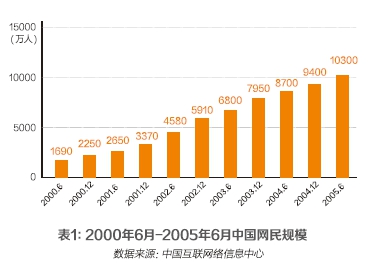
Rapid development period (2005-2013):
Broadband network construction has become a national strategy, the number of netizens has maintained rapid growth, online retail and social network services have become the highlights of industrial development, and the rise of mobile Internet has driven the development of the Internet into a new stage. Social networking services are increasingly integrated into people’s daily lives, and "no social interaction, no life" has become the new normal of China netizens’ life. The rapid popularization of smart terminals and mobile Internet applications has promoted the "ubiquity" of the Internet, promoted the integration of online and offline, and stimulated information consumption. China has promoted Internet development and Internet governance to a new height (see Table 2).
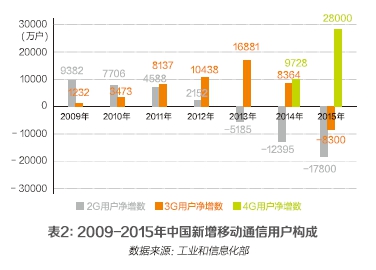
Integrated innovation period (2014- present):
Blow the horn of building a network power. The period of integration and innovation is now in progress. Since the 18th National Congress of the Communist Party of China, the CPC Central Committee, with the Supreme Leader as the general secretary, has attached great importance to network security and informatization, made a series of major strategic decisions, such as building a network power and improving the leading system of Internet management, and China’s Internet development has ushered in a period of major strategic opportunities. Internet governance in China is entering a new stage of integration and innovation. It will focus on national security and long-term development, further strengthen the top-level design, improve the governance system, further promote the rule of law, comprehensively strengthen network security, and strive to build a clear cyberspace.
Internet technology industry realizes innovation and leap-forward development
China has deeply implemented the innovation-driven development strategy, and achieved major breakthroughs in many fields, such as network technology, mobile chips, intelligent terminals, cloud computing, big data, satellite navigation, etc., and a number of internationally competitive network information enterprises have emerged, initially forming an advanced and independent Internet technology industry system.
The independent innovation capability of network technology has been significantly enhanced. Network technologies such as data communication, mobile communication and optical communication technology have continuously achieved innovative breakthroughs, and the first generation of Internet has accelerated its layout.
Intelligent terminal manufacturing industry has accelerated its catch-up. As of June 2015, the number of mobile Internet users in China reached 594 million, accounting for 88.9% of the total Internet users (see Table 3).
New technologies and applications are constantly cultivated to form new formats. New technologies and applications such as cloud computing, big data, Internet of Things, artificial intelligence and Beidou navigation have continuously made new breakthroughs and ushered in a new climax of industrial development.
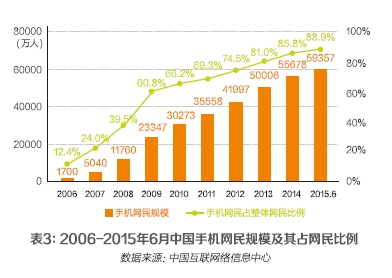
Internet accelerates economic transformation and upgrading.
China promotes the deep integration of Internet and economy in an all-round way, and new modes and formats of Internet-based integrated development are constantly emerging, which provides new kinetic energy for the speed change, structural optimization and power conversion of economic development, and accelerates the economic transformation and upgrading, quality improvement and efficiency improvement.
E-commerce leads the development of Internet economy, and the scale of online retail transactions ranks first in the world. The total transaction volume of e-commerce market in China increased from less than 1 trillion yuan in 2004 to 13.4 trillion yuan in 2014, with a compound annual growth rate of 30.6% in the past ten years.
The innovation of Internet information service is active, and the mobile Internet has become the accelerator of Internet information service. In the second quarter of 2015, there were 600 million monthly active users of WeChat and 212 million monthly active users of Sina Weibo. As of June 2015, there were 536 million search engine users and more than 606 million instant messaging users.
"internet plus" drives industrial integration and development. O2O has become the most active field of mass entrepreneurship and innovation, and online retailing has driven logistics to become a new billion-dollar industry, with 359 million online payment users. From 2009 to 2014, the compound annual growth rate of third-party Internet payment transactions remained above 50%, and the market scale exceeded 8 trillion yuan (see Table 4).
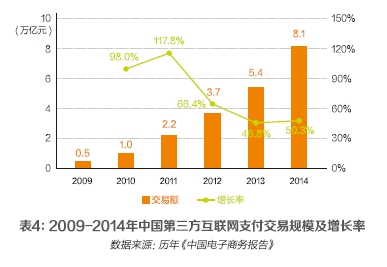
Internet can effectively improve the level of public services.
China pays attention to making use of the universal, convenient and sharing characteristics of the Internet, accelerating the socialized application, promoting the development of e-government, innovating social governance methods, improving the level of public services, and promoting the improvement of people’s livelihood and social harmony.
E-government to build online government. In 1999, marked by the launch of the "Government Online Project", the informatization construction of China government entered a new stage, and the construction of government websites at all levels achieved remarkable results.
Internet promotes social sharing of quality education resources. China vigorously promotes the "three links and two platforms" (broadband network for school-to-school communication, high-quality resources for classes, online learning space for everyone, public service platform for educational resources, and public service platform for education management). The proportion of Internet access in primary and secondary schools is 83%, and the number of schools with multimedia classrooms is 73%.
Internet promotes the precision and personalization of medical and health services. Internet medical services are booming, all kinds of portable medical intelligent terminals and wearable devices make mobile medical care closer to people’s lives, and the digital health App market is in the ascendant, which promotes the transformation of hospital-centered medical treatment mode to people-centered health service mode.
Internet promotes people’s balanced development. Internet users in China have formed a rich and diverse netizen structure with different social groups of gender, age, education, occupation and income. The gap in Internet access between different gender groups has basically disappeared, and the difference in education level has declined most obviously.
Healthy and progressive network culture prospers and develops.
1. Network culture is an important part of socialist cultural construction.
2. China characteristic network information dissemination pattern has basically taken shape. In June 2015, the number of online news users reached 555 million, and the utilization rate among netizens was as high as 83.1%. Among them, the number of news users on mobile phone network reached 460 million (see Table 5).
3. The influence of Internet communication has been significantly improved.
4. The Internet actively spreads the voice of China.
5. The online cultural industry and cultural undertakings have flourished.
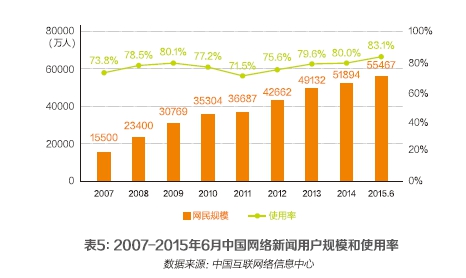
Network security capabilities continue to improve.
Without network security, there is no national security. China insists on ensuring development by security and promoting security by development, and strengthens the construction of network security guarantee capacity while promoting the development of the Internet. The network security guarantee system is increasingly sound and the network protection capacity is gradually improved.
1. The network security system is becoming increasingly sound.
2. The industrial system of network security technology was initially established.
3. The network security protection capability has been significantly enhanced.
4. The discipline construction has been continuously strengthened, and the awareness of network security has been significantly improved.
The legalization of cyberspace has been accelerated.
China adheres to the rule of law, running and surfing the Internet according to law, strengthens network legislation, strictly enforces the law, guides the whole network to abide by the law, accelerates the construction of cyberspace rule of law, and regulates cyberspace behavior with the rule of law, thus providing a solid guarantee for the healthy development and orderly operation of the Internet.
Internet laws and regulations have been continuously improved. China has successively promulgated a series of laws and regulations related to the Internet, covering basic Internet resource management, information dissemination norms, market order norms, information security and other aspects, which provide an important legal basis for the development and governance of the Internet, and the ecological governance of cyberspace is standardized and orderly. China strengthens the management of Internet basic resources such as domain name, IP address, website registration and access service according to law.
The awareness of network rule of law and network literacy have been significantly enhanced.
The Internet governance system is gradually improved through exploration.
China attaches great importance to Internet governance, constantly adjusts and improves the leadership system of Internet management, promotes the formation of a government-led and multi-party governance system, actively advocates the construction of a peaceful, safe, open and cooperative cyberspace, and promotes the establishment of a multilateral, democratic and transparent international Internet governance system.
The internet management leadership system has been adjusted and improved. Adhering to the principle of focusing on development and management, China has gradually established an Internet governance system that combines legal norms, administrative supervision, industry self-discipline, technical support, public supervision and social education.
The government-led and multi-party participation governance model has taken shape. China Municipal Government has comprehensively adopted various measures, such as legal regulation, administrative management, industrial policy, technical standards, publicity and education, to coordinate all parties to actively participate in Internet governance.
Actively participate in global Internet governance. China has always advocated jointly safeguarding global Internet security, jointly promoting global Internet development, and sharing global Internet opportunities and achievements. In international exchange and cooperation activities, it put forward the idea of Internet governance in China.
China’s Experience of Internet Development
Over the past two decades, China has opened up a road of Internet development with China characteristics, and gained valuable experience. To sum up, it is: adhering to the leadership of the Party, serving the people, opening up cooperation, innovation-driven, giving full play to the main role of enterprises, and paying equal attention to safety and development.
The road to a strong network country
Standing at a new historical starting point, China will comprehensively plan the strategic layout of strictly administering the Party, thoroughly implement "the Central Committee of the Communist Party of China’s Proposal on Formulating the Thirteenth Five-Year Plan for National Economic and Social Development" deliberated and adopted by the Fifth Plenary Session of the 18th CPC Central Committee, establish the development concept of innovation, coordination, green, openness and sharing, vigorously promote the strategy of strengthening the country through the Internet, speed up the implementation of the "internet plus" action plan, lead the way of Internet development in China, and contribute to the prosperity and development of the world Internet.
(Text/China Cyberspace Research Institute)






